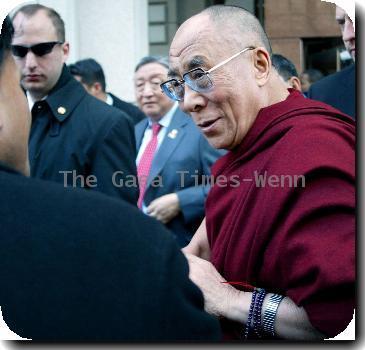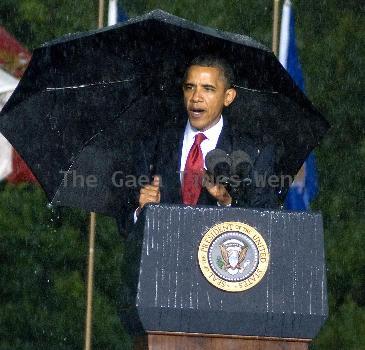Clinton, in Latin America, seeks elusive solidarity on immigration, security, Honduras coup
By Matthew Lee, APMonday, June 7, 2010
Clinton seeks elusive solidarity in Latin America
LIMA, Peru — U.S. Secretary of State Hillary Rodham Clinton opened a four-nation tour of Latin America and the Caribbean Monday hoping to boost cooperation on security matters and build consensus on contentious issues like U.S. immigration laws and the fallout over last year’s coup in Honduras.
In discussions taking place against the backdrop of broader international developments, Clinton will also be seeking regional support for efforts at the United Nations to slap new sanctions on the Iran over its suspect nuclear program, hold North Korea responsible for the sinking of a South Korean warship and deal with the deteriorating situation in the Gaza Strip.
After meeting Peruvian President Alan Garcia on Monday, Clinton said Iran and North Korea must be made to understand that “their actions pose a threat to the peace and stability of the world community.” Before arriving in Lima, she predicted that Iran would try to “pull some stunt” to avert a U.N. Security Council vote on sanctions this week.
Clinton is in Lima for the annual general assembly of the Organization of American States, and even with global matters looming over the session she will be stressing the Obama administration’s commitment to promoting stability and democracy in the Western hemisphere.
Yet one of the most divisive topics facing the OAS — whether to readmit Honduras to the regional bloc — isn’t on the formal agenda. Nicaragua on Monday lost a last-minute bid to include Honduras on the agenda when a majority of foreign ministers objected. An attempt by Ecuador to get Israel’s raid on a Gaza aid flotilla on the agenda was also rejected.
The U.S. wants Honduras allowed back into the organization following elections that brought the current president, Porfirio Lobo, to power after the June 2009 coup that ousted his predecessor, Manuel Zelaya. Other governments, notably Argentina, Brazil, Ecuador, Nicaragua and Venezuela, are opposed and insist that Zelaya be allowed to return home first.
Clinton noted that the United States, along with the rest of the OAS, had condemned the coup but had also worked to restore democratic order.
“Now it is time for the hemisphere as a whole to move forward and welcome Honduras back into the inter-American community,” she told the group.
Lobo, she said, had fulfilled his pledges to form a unity government and created a national reconcilation commission. “He has demonstrated a strong and consistant commitment to democratic governance and constitutional order,” she said.
Also of great concern in Latin America is Arizona’s new immigration law, which some believe will lead to racial profiling. While this, too, is not on the formal agenda, Clinton expected to get earful about it from her colleagues even though President Barack Obama has said the law is “poorly conceived” and “not the right way to go.”
The law, which takes effect July 29 unless blocked by a court as requested under pending legal challenges, also makes it a state crime to be in the U.S. illegally or to impede traffic while hiring day laborers, regardless of the worker’s immigration status. It would become a crime for illegal immigrants to solicit work.
OAS Secretary-General Jose Miguel Insulza has called the law “an issue of concern to all citizens of the Americas, beginning with the citizens of the United States.” Other nations have complained loudly about it.
Guatemalan Foreign Minister Haroldo Rodas Melgar on Monday called the migration issue one of the most critical to regional solidarity. He did not mention the Arizona law but spoke out against legislation that “violates human rights” and denies the people of the hemisphere “dignity and respect.”
From Peru, Clinton travels Tuesday to Ecuador for talks with President Rafael Correa and to deliver a speech outlining the administration’s broad policy toward the region, which has a heavy emphasis on fighting the narcotics trade.
In Colombia, a major ally that had been the recipient of massive U.S. aid to combat drug trafficking, she will see the departing president, Alvaro Uribe.
She plans to meet with the two candidates to succeed Uribe: former defense minister Juan Manuel Santos, who helped craft the current president’s popular security policies, and rival Antanas Mockus, the ex-two-time mayor of Bogota who has promised clean government and a tax increase. The candidates are in a June 20 runoff election.
Clinton will close out the trip in Bridgetown, Barbados, where she will see foreign ministers from Caribbean island nations to discuss endemic crime, violence and narco-trafficking.
On Sunday, Clinton mentioned the situation in Jamaica, where bloody street battles erupted last month as authorities searched for a reputed drug lord. “Even countries with stable political systems and trained police forces and military assets can be facing tremendous challenges from these well-organized drug traffickers,” she said.
Online:
State Department: tinyurl.com/24l65m8
OAS: www.oas.org
Tags: Asia, Barack Obama, Caribbean, Central America, Colombia, Drug-related Crime, East Asia, Ecuador, Gaza Strip, Honduras, Iran, Latin America And Caribbean, Lima, Middle East, North America, North Korea, Palestinian Territories, Peru, South America, United States



